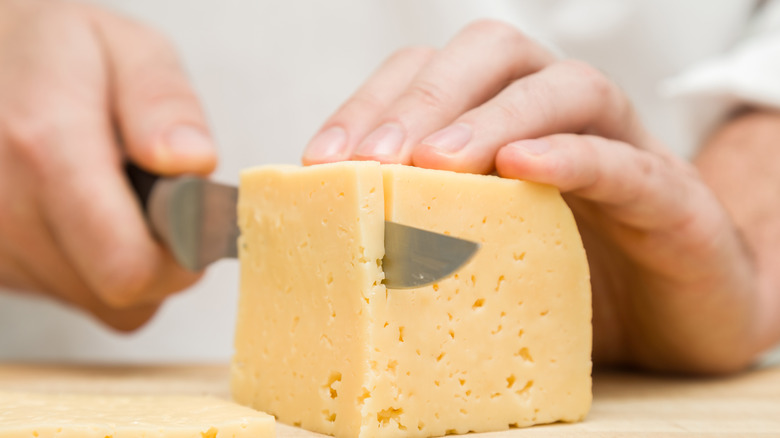Why Low-Fat Cheese Could Actually Be Unhealthy
Fat in food gets a bad rap because it's very easy to associate it with body fat. So, you might think adding less fat to your diet is good. But not all fat is created equal, and your body needs good fat to thrive. Healthy fats, like those found in avocados, actually help your body to function properly and stay fit. But is the same true about cheese?
Dairy products are one area where it seems easy to shave off some of the fat you consume. But the research doesn't support it. Taking the fat out of cheese can make it unhealthier. The why behind it is complicated but can be broken down into two different factors. First of all, the fat in cheese is good to keep you feeling full and, therefore, eating less of it. The other factor is the fillers. Most of the flavor of the cheese you love comes from the milk fats that create it. When you remove that fat, you need something else to add to give it that wonderful rich flavor.
Let's dive into the research behind why full-fat cheese might be the healthier choice for a well-rounded diet and get the facts about why fillers added to low-fat cheese options could make it unhealthier.
The importance of fat in cheese
It's a well-known fact that cheese is high in three things—fat, calories, and flavor. That's why it's hard for many people to give up their cheese or switch to a low-fat version when trying to live a healthier lifestyle. But do you have to? Research doesn't support the idea that switching to low-fat cheese will help you lose weight or live healthier because studies show eating full-fat cheese doesn't contribute to weight gain and allows you to feel fuller longer.
A 2016 American Journal of Clinical Nutrition study found that "greater intake of high-fat dairy products, but not intake of low-fat dairy products, was associated with less weight gain" and that you had a lower risk of becoming obese when consuming high-fat dairy products, like cheese. Additionally, a 2020 study in the Journal of Dairy Science illustrated that dairy products played a role in keeping your hunger under control and helping you feel full longer.
Nicole Magryta, a registered dietician, also told The Washington Post, "When the fat is processed out of dairy foods, you lose not only the flavor but the food's natural ability to keep you full. Whole-fat cheese also helps to balance blood sugars, which may have to do with its high amounts of vitamin K, vitamin D, and calcium."
However, it's not just about the importance of the rich fats in keeping you satiated longer. Low-fat cheeses have fillers that can make them less healthy options.
Low-fat options add fillers
You can't take something out of cheese without putting something back in, and cheese is full of fat, which gives it that rich and mouthwatering flavor. Low-fat cheese doesn't satisfy your craving and won't leave your refrigerator much. New Food Magazine noted, "A reduction in the fat content of cheese can alter melting, slicing, shredding, flavour, and texture." So, to keep the savory flavor and a consistent texture, low-fat cheese options have non-dairy fillers added back into them — like gums and thickeners — making them processed foods.
Processed foods include unhealthy ingredients and have health risks that can be worse than the unprocessed foods they're replacing. For example, the American Journal of Lifestyle Medicine showed these foods carried risks of cancer, obesity, and stroke. There were also links between processed foods and increased diabetes and serious illnesses. So, before you grab a low-fat option, it's important to be sure what all the ingredients are, Magryta told The Washington Post.
However, when it comes to heart health, keep in mind that eating too much saturated fat can raise your levels of the so-called "bad" LDL cholesterol and increase your risk for heart disease. Eating full-fat cheeses in moderation and choosing ones naturally lower in saturated fat, like Swiss cheese and mozzarella, can be a healthier choice, according to Eating Well.
Make sure to do your research and speak to your healthcare specialist when making better, healthier choices about cheese.



